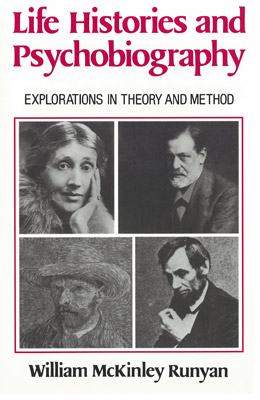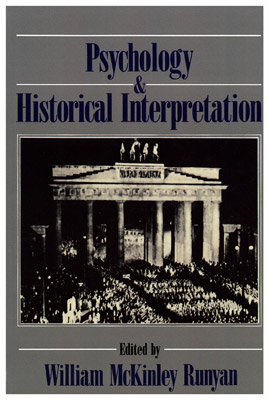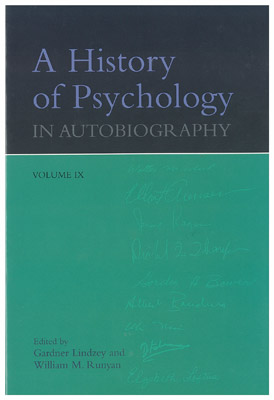

|
For my Festschrift in the Fall 2023 issue of Clio's Psyche, I thank James William Anderson for the detailed biographical article on pages 52-59.
I also thank each of the contributors this Festschrift. The Festschrift turned out much better than I imagined. For "Essays" I thank Raymond E. Fancher, *Michael M. Sokal, Daniel S. Benveniste, Amy P. Demorest, Nicole B. Barenbaum, Susan Bluck, Lonnie R. Snowden, Jefferson A. Singer & Emma Lombardo, Dean Keith Simonton and Dan P. McAdams.
For "Tributes", I thank Jim Clark, Marilyn Fabe, Nancy C. Unger, Claude-Helene Mayer, Paul H. Elovitz, Joseph G. Ponterotto, and William Todd Schultz. I appreciate busy people taking the time to think about and write each of these pieces.
Most of all, I want to thank Paul H. Elovitz for creating and editing Clio's Psyche from 1994 to the present. Paul Elovitz is also author of The Making of Psychohistory: Origins, Controversies and Pioneering Contributors (2018), and editor of The Many Roads of the Builders of Psychohistory (2021). In recent years, Inna Rozentsvit has been contributing much as Associate Editor.
Click the image of the cover of Clio's Psyche to download or view the Festschrift articles. Past articles in Clio's Psyche from 1994 to the present are available online.
|
| Mac Runyan |
* Click here to view the unedited version of Michael M. Sokal's article with more details about the career of James McKeen Cattell.

The Journal of the History of the Behavioral Sciences:
"'The one essential book in the field' In this pathbreaking study, Runyan reviews and responds to major criticism of psychobiography and of the case study method, and suggests criteria for evaluating and improving in-depth studies of individual lives. Theoretical points are vividly illustrated iwth examples from the lvies of (among others) Vincent Van Gogh, Emily Dickinson, Abraham Lincoln, Shakespeare, Malcolm X, Woodrow Wilson, Virginia Woolf, and several of Freud's classic case studies. "The most informative, clear, objective, and comprehensive book written on this topic to date. It is both the ideal text for a graduate course in psycho-history and the one essential book in the field which every library should have."
Additional praise for Life Histories and Psychobiography: Explorations in Theory and Method
"Clinicians will find this book useful as they attempt to place life histories obtained in an explanatory, help-giving relationship into a scientific context...A reasoned, informative presentation supported by an adequate bibliography." - Journal of Nervous and Mental Disease
"Entertaining as well as illuminating...an extremely valuable gathering of approaches to life history and psychobiography."- Qualitative Sociology
"An outstanding work. In this small volume Runyan makes a clear and compelling case for the importance of idiographic studies to the understanding of human behavior."- New Ideas Psychology
"Runyan's training [in academic psychology] enables him to approach the psychobiography debate with an engaging and informed skepticism. He employs the perspectives and parameters of empirical science to clarify the welter of facts and hypotheses on which assertions in psychobiography are often based." - Journal of Modern History
Available from Amazon.com

Amazon.com:
"What contributions can psychology make toward understanding the course of individual lives and the flow of historical events? After an introduction which reviews the intellectual and institutional history of the field, chapters by distinguished contributors explore the uses of psychoanalysis, neo-analytic theory, and academic psychology in historical interpretation. Substantive examples range from Joseph Stalin to Alice James, sexuality in Victorian England, the U.S. Continental Congress, and advances in psychohistorical studies of Adolf Hitler and Nazi Germany. The conclusion re-examines the conceptual foundations of psychohistory, outlining its differentiated internal structure and its relationships to adjacent fields such as psychological anthropology, historical sociology, and political psychology. The volume as a whole is intended to advance and deepen the debate about the relationships between psychology, biography, and historical interpretation."
Additional praise for Psychology and Historical Interpretation
"Showing that psychological understanding need not be limited to psychoanalysis, Runyan develops a comprehensive conceptualization for the use of psychology in psychohistory, a harbinger of good things to come in this significant field." - Robert W. White, Professor Emeritus Clinical Psychology, Harvard University
"Skeptical about psychohistory, I.... thoroughly enjoyed it. This is an honest, well-written, intelligent discussion of contemporary psychohistorical work. " - Sheldon H. White, Professor of Psychology, Harvard University

Also edited by Gardner Lindzey, PhD, director emeritus of the Center for Advanced Study in the Behavioral Sciences. Dr. Lindzey received his PhD from Harvard University in 1949 and subsequently was a professor at the University of Texas, where he was also vice president and dean of graduate studies. Dr. Lindzey was president of the American Psychological Association (1966-1967) and director of the Center for Advanced Study in the Behavioral Sciences from 1975 to 1989.
Amazon.com:
"The latest installment in the History of Psychology in Autobiography series takes readers through the personal and intellectual journeys of nine eminent people whose research has propelled the field of psychology into the 21st century. Each featured psychologist narrates how historical circumstances, collaborations, internal struggles, and even public conflict led him or her to open and develop various lines of research. Their stories are, by turns, humorous, creative, and courageous.
Over the past fifty years psychology has expanded from behaviorism and psychoanalysis into cognitive and social theories of learning and brain-based models of behavior and memory. Contributors to this volume document their role in these and other movements, including personality theory and assessment and child development. Readers interested in applied psychology will find valuable insights in authors' accounts of their involvements in such diverse areas as education design, civil rights, courtroom testimony, media policy, and economics. Editors Gardner Lindzey and William M. Runyan have brought together a collection of essays that put a human face on the maturing science of psychology."

